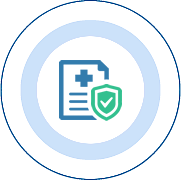Wildcard SSL Certificates

Secure your domain and unlimited subdomains at affordable rates using wildcard SSL certificates
If you wish to secure your website and its subdomains without the hassles of managing multiple certificates tied with each of them, a wildcard certificate might be the right choice. It is a cost-effective solution that secures a primary domain (also called a fully qualified domain name or FQDN) and an unlimited number of first-level subdomains without the need to reissue the certificate as you add subdomains.
Comodo PositiveSSL Wildcard Certificate

Immediate Issuance
256 Bit Encryption
Dynamic Trust Seal
99% Browser Support
Comodo EssentialSSL Wildcard Certificate

Issued Immediately
$10,000 Warranty
128/256 bit encryption
Trusted by All Browsers
Comodo Wildcard SSL Certificate

$250,000 Relying Warranty
Domain Validated SSL
Static Site Seal
2048 bit digital signatures
Comodo PremiumSSL Wildcard Certificate

128/256 bit encryption
99.9% Browser coverage
Issued In 1-3 days
Full Business Validated
Comodo Positive Multi-Domain Wildcard SSL

Immediate Issuance
256 Bit Encryption
Domain Validated SSL
SAN option enabled
Comodo Multi-Domain Wildcard SSL

2 FREE SAN Included
Full Business Validated
Unlimited Server Licenses
256 Bit Encryption
Comodo Unified Communication Wildcard Certificate

Full Business Validated
Supported by MS� Exchange server
Unlimited server licenses
2048-bit SSL Certificate
How Does a Wildcard Certificate Work?
Simply put, a wildcard SSL is a certificate that secures a single domain and unlimited subdomains at the same level. This is done by covering all first-level subdomains under the same wildcard - *.domainname.com.
The asterisk is used to specify the level of subdomains that you’re attempting to secure. For example, *.mynewsite.com secures every subdomain at one level like blog.mynewsite.com and order.mynewsite.com, but not login.blog.mynewsite.com.
Features of a Wildcard SSL
- Easy Certificate Management: One single SSL certificate can secure an unlimited number of subdomains at one specific level.
- Strong Encryption: Come with 256-bit strong encryption and a 2048-bit RSA signature key.
- Unlimited Server Licenses: Irrespective of where your subdomains are hosted, you can install the same certificate on multiple servers at zero additional cost.
A Word of Caution
The private key for a wildcard SSL is shared among all the subdomains across servers. Unauthorized access to the site’s private key will compromise security and can be used by hackers to set up rogue websites.
What Is the Difference Between a Standard SSL and a Wildcard Certificate?
With a standard SSL certificate, there’s no scope for adding an asterisk (*) to secure an entire level of subdomains. To secure multiple domains or subdomains using a regular certificate, you need to list them as subject alternative names (SAN) on a multi-domain certificate. For every domain you wish to protect, additional charges are levied.
Wildcard certificates, on the other hand, automatically secure an unlimited number of subdomains of a primary domain without the need to list them individually and at no additional cost.
Can I Get an EV Wildcard Certificate?
The short answer is no, you can’t get an EV wildcard certificate. Due to the risks surrounding private key security, and the impact of unauthorized access across all subdomains, EV certificates are not issued together with wildcard SSL in accordance with the rules defined by the CA/Browser forum. Such breaches may go unnoticed and can be extremely difficult to detect and track, giving attackers the undue advantage of setting up phishing sites with valid SSL certificates.
What's covered? And what's included?
Multi-domain certificates are available in all three validation types: Domain Validated (DV), Organization Validated (OV), and Extended Validation (EV). So, whether you're looking to secure a bunch of internal domains where trust isn't as important, or all of your company TLDs where trust is of the utmost importance, we have a UCC option for you!
Wildcard SSL certificates, like other SSL technology, offer standard up to 256-bit encryption on your website. This helps keep private information private, as SSL protects data in transit, meaning your online customers will feel safe and secure when submitting any form of online payment, logging into an account with a username/password, signing up for newsletters, etc.
Benefits of Multi-Domain SSL Certificates

HTTPS + Securing multiple FQDNs

Fast Issuance






